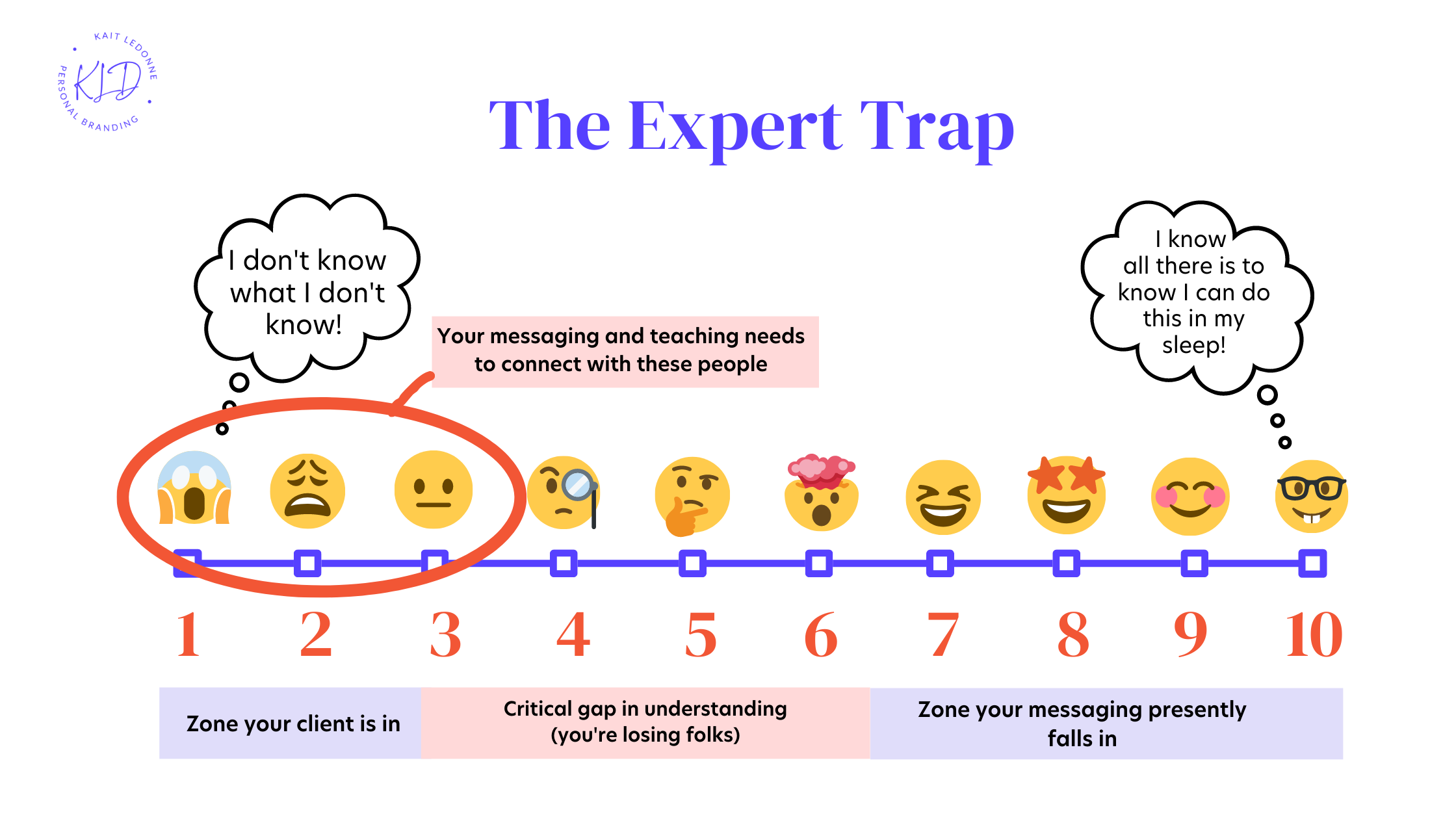From Jargon to Jackpot: How to Speak Your Prospects' Language so Your Marketing Soars 🔑💰
Jun 29, 2023
I'm going to let you in on a little personal branding secret, one that will radically change everything (yes, everything) you do when it comes to communication and messaging.
This critical mindset shift will…
- Help you create and deliver binge-worthy keynotes, presentations, and podcasts
- Send folks straight from reading your content in newsfeeds to inquiring about your services
- Change the quality of your consultations and coaching calls so you can facilitate more “aha’s” with your clients and students
- Deepen the level of fulfillment and joy you experience in your work
And if you think that is just marketing hyperbole… let me kick off with a personal story that happened just last week.
I was preparing to guide a personal brand bootcamp, a 4-hour workshop where I work one-on-one with clients to sharpen their messaging, overhaul their online presence, and develop a content plan to increase their following and boost business.
Now, despite running these workshops for nearly 10 years and receiving glowing reviews, I’d be lying if I said I don’t feel slight jitters before each one. Every single client that we work with is so accomplished in their career and is a bonafide expert in their space.
This particular client— we’ll call her Lisa— had a resume of accolades longer than a CVS receipt. She’s an author, doctor of public health, a tenured professor, and counts bestselling authors and famous Ted talkers as previous students.
I mean, just reading through the treasure chest of content she provided to us was like getting an advanced degree! Pam (my right hand) and I were blown away, completely fangirling over her and her work.
And on the back of that burning excitement came a little voice…
“Oh wow, this woman is the bee’s knees. You need to ensure you REALLY impress her. Can you coach a master coach for four hours?”
I smiled as I heard my own inner dialogue. I responded back to it with compassion:
“Oh, you. There you are, my little worried friend. You’re still living in the imposter syndrome past of our younger, less experienced self. But you and I both know that we’ve been at this for over a decade, and we know our stuff. Remember, our goal is not to impress. It’s to serve. Yes, Lisa is brilliant in her field, but she doesn’t understand our field. We need to connect the dots in a way that’s easy to grasp so her brand can take off like you know it will.”
I then sat down, meditated for 20 minutes, and continued preparing for the workshop.
Spoiler alert: That workshop rocked.
Now, why do I share that story? To illustrate the very real, ever-present trap we fall into as humble experts. A trap so prevalent it’s hard to realize you’re even in it. A trap so sticky it can even have you questioning your own worth and value(!!!).
Behold…The Expert Trap
The expert trap happens when you begin to worry more about impressing your clients than educating or clarifying concepts for them. It also happens when you’re so ingrained in your day-to-day domain of expertise you don’t even realize you’ve lost your audience.
Here’s how it can manifest:
- You consciously (or unconsciously) speak at a peer level rather than a prospect/audience level.
- You aim for complex answers rather than straightforward solutions.
- You spend wayyyy too much time in your head overanalyzing your competition, your peers, and your aspirational mentors and not enough time delivering value to the people who need it most.
Here’s a visual example I often use to show people how dangerous the expert trap is:

So, how can we avoid falling into the expert trap?
A combination of mindset and habits can help.
Critical “mind-shift” number one:
💡Realize that your audience can be sharp as a tack, but when it comes to your domain of expertise, they are only at a beginner level.
Realizing this and repeating it like a mantra before you create content, teach, or deliver your services will help ensure your language meets your prospects where they’re presently at.
Now, let’s explore 5 helpful habits to actualize how to overcome the expert trap:
1. Understand your target audience’s journey 🌍
It’s not enough to know the demographics and psychographics of your target audience, you also need to be keenly aware of where they’re at in their journey to achieve results in your field. For example, you may encounter two “Brendas” who work in HR for a Fortune 500 company but are in two very different places of understanding when it comes to international benefits. Perhaps one has had a job where she had to choose an international plan, and the other is just starting to learn more about international benefits. Your messaging to these two “Brendas” would be different.
2. Drop the jargon🚫💬
Avoid jargon, technical terms, or industry-specific acronyms that might confuse or alienate your audience. While you may be incredibly comfortable with “SCRUM,” folks who are just learning the field of project management are not and will tune out when you casually throw around more complex terms.

3. Focus on benefits and solutions🎯💡
Instead of highlighting theories and practices, focus on empathizing with the pain your audience feels as it relates to your industry and emphasize the benefits and solutions you can offer to their clients. Remember, if they knew the theories and practice, they wouldn’t be coming to you!
4. Tell compelling stories📚🎭
Stories have a powerful impact on human emotions and can captivate an audience. By sharing stories that resonate with your audience, you can illustrate real-life scenarios, challenges, and successes. By weaving narratives that depict relatable situations, you engage the audience and make their message more memorable.
5. Engage in two-way communication🗣️💬
Instead of solely broadcasting your message, actively engage in conversations with your audience. Encourage feedback, questions, and discussions through various channels, such as social media platforms, email, or live events. This interaction allows you to better understand your audience's concerns and tailor your marketing efforts accordingly.
The Recap:
1. Understand your target audience's journey: It's important to be aware of where your audience is in their understanding of your field and tailor your messaging accordingly.
2. Drop the jargon: Avoid using technical terms and industry-specific acronyms that may confuse or alienate your audience.
3. Focus on benefits and solutions: Instead of emphasizing theories and practices, empathize with your audience's pain points and highlight the benefits and solutions you can offer.
4. Tell compelling stories: Stories have a powerful impact on emotions and can captivate an audience. Share relatable narratives that depict real-life situations, challenges, and successes.
5. Engage in two-way communication: Encourage feedback, questions, and discussions with your audience to better understand their concerns and tailor your marketing efforts accordingly.
Looking for a community of high-income experts growing their personal brand online?
Join our Brand Inner Circle Community. For $250/month, you’ll get access to weekly 90-minute writing labs led by yours truly, monthly Q&A, networking, and content prompts galore.
|
|
